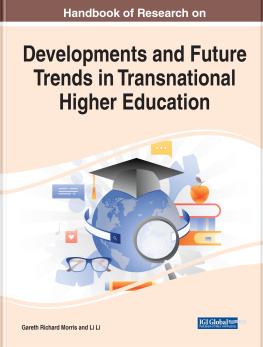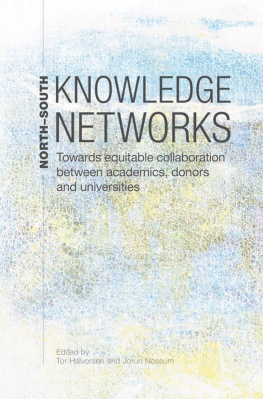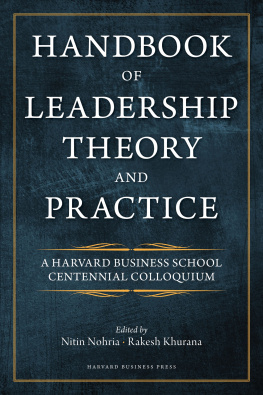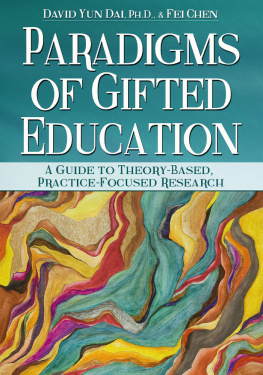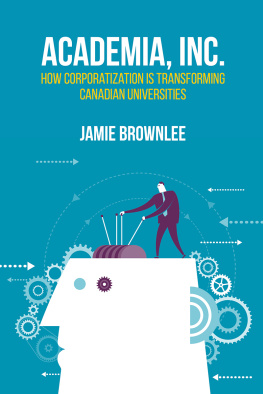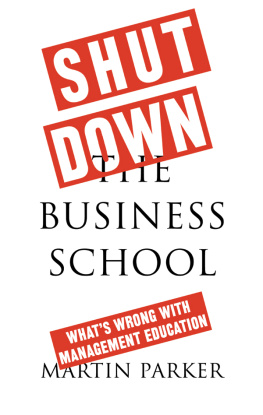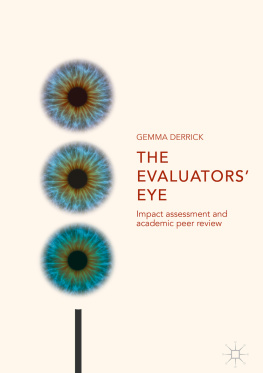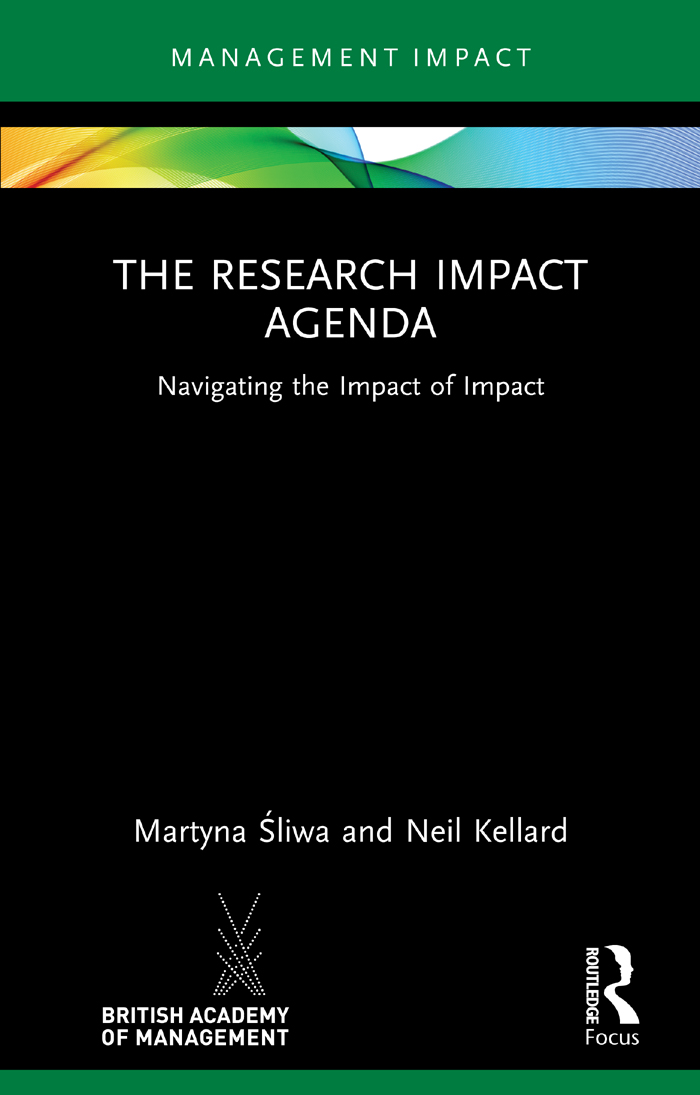This book contributes to the growing body of work addressing the processes and consequences of national governments audits of the performance of higher education institutions (HEIs) in different countries. The book discusses one recent area of focus within these audits, namely the measurement of universities societal and economic impact.
The book will be of interest to a wide range of readers regardless of their formal position, organisational affiliation or career stage who consider it important to reduce and remove inequalities and inequities within the HE sector and to make universities and business schools more inclusive. The readers will benefit from the opportunity to engage in reflection aimed at transforming the current framing, delivery, and assessment of business and management research impact.

Management Impact
Series Editors: Jean M. Bartunek, Nic Beech and Cary Cooper
Scholarly research into business and management proliferates globally. Its impact into management practice can be difficult to monitor and measure. This series, published in association with The British Academy of Management, presents Shortform books that demonstrate how management scholarship has impacted upon the real world.
Incorporating case study examples and highlighting the link between scholarship, policy, and practice, the series provides an essential resource for postgraduate students and researchers seeking to understand how to create impact through their work. The concise nature of the books also ensures that they can be useful reading for reflective practitioners.
Delivering Impact in Management Research
When Does it Really Happen?
Robert MacIntosh, Katy Mason, Nic Beech and Jean M. Bartunek
Impact and the Management Researcher
Usha C.V. Haley
The Research Impact Agenda
Navigating the Impact of Impact
Martyna liwa and Neil Kellard
For more information about this series, please visit: www.routledge.com/Management-Impact/book-series/IMPACTM
The Research Impact Agenda Navigating the Impact of Impact
Martyna liwa and Neil Kellard

First published 2022
by Routledge
2 Park Square, Milton Park, Abingdon, Oxon OX14 4RN
and by Routledge
605 Third Avenue, New York, NY 10158
Routledge is an imprint of the Taylor & Francis Group, an informa business
2022 Martyna liwa and Neil Kellard
The right of Martyna liwa and Neil Kellard to be identified as authors of this work has been asserted in accordance with sections 77 and 78 of the Copyright, Designs and Patents Act 1988.
All rights reserved. No part of this book may be reprinted or reproduced or utilised in any form or by any electronic, mechanical, or other means, now known or hereafter invented, including photocopying and recording, or in any information storage or retrieval system, without permission in writing from the publishers.
Trademark notice: Product or corporate names may be trademarks or registered trademarks, and are used only for identification and explanation without intent to infringe.
British Library Cataloguing-in-Publication Data
A catalogue record for this book is available from the British Library
Library of Congress Cataloguing-in-Publication Data
Names: liwa, Martyna, author. | Kellard, Neil, author.
Title: The research impact agenda : navigating the impact of impact / Martyna liwa and Neil Kellard.
Description: First Edition. | New York : Routledge, 2022. |
Series: Management Impact / series editors, Jean M. Bartunek, Nic Beech and Cary Cooper | Includes bibliographical references and index.
Identifiers: LCCN 2021037533 (print) | LCCN 2021037534 (ebook) | ISBN 9780367547493 (Hardback) | ISBN 9780367547516 (Paperback) | ISBN 9781003090465 (eBook)
Subjects: LCSH: Education, Higher--Research--Cross-cultural studies. | Education, Higher--Social aspects--Cross-cultural studies. | Education, Higher--Economic aspects--Cross-cultural studies. | Higher education and state--Cross-cultural studies. | Educational equalization.
Classification: LCC LB2326.3 .S55 2022 (print) | LCC LB2326.3 (ebook) | DDC 378.007--dc23
LC record available at https://lccn.loc.gov/2021037533
LC ebook record available at https://lccn.loc.gov/2021037534
ISBN: 978-0-367-54749-3 (hbk)
ISBN: 978-0-367-54751-6 (pbk)
ISBN: 978-1-003-09046-5 (ebk)
DOI: 10.4324/9781003090465
Typeset in Times New Roman
by MPS Limited, Dehradun
Contents
Introduction
DOI: 10.4324/9781003090465-101
This book contributes to the growing body of work addressing the processes and consequences of national governments audits of the performance of higher education institutions (HEIs) in different countries. Specifically, we address one recent area of focus within these audits, namely the measurement of universities societal and economic impact. Since the book is part of a collaborative short format series between the British Academy of Management and Routledge dedicated to business and management research impact, central to our discussion are issues related to the generation and measurement of impact of business schools in the UK conducted as part of the Research Excellence Framework (REF) audit. However, this does not mean that the relevance of our argument is limited to the UK or, indeed, the business school context. Although audit frameworks similar to the REF have been introduced in other national higher education systems, e.g. Australia, Brazil, and Poland, the UK is the first country in which the measurement of universities impact has taken place, and therefore the first and so far the only source of rich, empirical material on impact assessment that we have been able to analyse and discuss.
The ability to develop insights based on our analysis of the UK REF impact process and its multi-faceted consequences for business schools and their staff has provided us with the opportunity to put forward an argument that is valid and applicable within the international context and in relation to the whole higher education sector, in particular in those countries that are considering the inclusion of impact in future audits of universities performance. Australia, e.g. carried out its first Engagement and Impact (EI) assessment in 2018, with the next exercise scheduled for 2024. As such, in addition to university and business school leaders and academics, as well as leaders of the two key UK-based professional associations, i.e. the British Academy of Management and the Chartered Association of Business Schools, we hope that our book will be of interest to politicians and HE policymakers internationally. Moreover, accrediting and professional bodies, with business school partners around the globe including in Africa, Asia, and South America, are increasingly including positive societal impact as a measurable requirement. Above all, we have written it for everybody regardless of their formal position, organisational affiliation, or career stage who considers it important to reduce and remove inequalities and inequities within the HE sector and to make our universities and business schools more inclusive.


